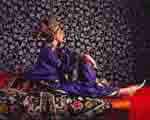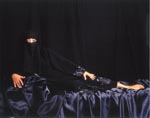Aidan Salakhova (Moscow). Habibi (painting, graphics).
 Aidan Salakhova has long been recognised as a defender of beauty and a beautiful woman. While both claims are fully justified, they still do not fully explain the essence of her art. Fifteen years ago, wanting to differ from everybody else, Salakhova produced brutal pictures of phalluses and vaginas. Ten years ago, when radical Russian artists were filling everything with genitalia and buttocks, she depicted enchanting odalisques. When the critics classified her to the St Petersburg school of Neo-Academism, Aidan once again changed her style. She created installations with live models (seductive odalisques on tables groaning with fruit), a shower rail and curtain inspired by Alfred Hitchcock’s Psycho, a painting of a pregnant model and a video recording of the model projected onto the canvas, conjuring up thoughts of torturous expectations.
Aidan Salakhova has long been recognised as a defender of beauty and a beautiful woman. While both claims are fully justified, they still do not fully explain the essence of her art. Fifteen years ago, wanting to differ from everybody else, Salakhova produced brutal pictures of phalluses and vaginas. Ten years ago, when radical Russian artists were filling everything with genitalia and buttocks, she depicted enchanting odalisques. When the critics classified her to the St Petersburg school of Neo-Academism, Aidan once again changed her style. She created installations with live models (seductive odalisques on tables groaning with fruit), a shower rail and curtain inspired by Alfred Hitchcock’s Psycho, a painting of a pregnant model and a video recording of the model projected onto the canvas, conjuring up thoughts of torturous expectations. Aidan Salakhova then made a cardinal shift towards the Islamic roots of eastern beauty. In the provocative Qa’bah video installation, female eyes – beautiful, sorrowful, happy, laughing and tempting — look out of a large box covered in black cloth, accompanied by the whirling dance of Sufis projected onto the wall. Aidan Salakhova’s latest exhibition breathes fresh life into her favourite odalisque theme. Sumptuous women lounge in classical poses on richly decorated couches, tempting and delighting the eye. The rich draperies concealing their beauty make them even more desirable. Like all good artists, Aidan includes album drawings in the Persian style. Hiding their faces behind veils in strict accordance with Islamic tradition, the women reveal the lower halves of their bodies, demonstrating what men really want — notwithstanding their romantic professions of love in poetry, music and art. Aidan Salakhova makes a direct gesture in these works. Habibi is Arabic for love and, combining a western mind and education with an eastern background and temperament, Aidan makes love the guiding force in her art. This approach echoes the words of the famous Sufi poetess Rabia al-Adawiyya: «How can I endure the next world without seeing your face?»
Aidan Salakhova then made a cardinal shift towards the Islamic roots of eastern beauty. In the provocative Qa’bah video installation, female eyes – beautiful, sorrowful, happy, laughing and tempting — look out of a large box covered in black cloth, accompanied by the whirling dance of Sufis projected onto the wall. Aidan Salakhova’s latest exhibition breathes fresh life into her favourite odalisque theme. Sumptuous women lounge in classical poses on richly decorated couches, tempting and delighting the eye. The rich draperies concealing their beauty make them even more desirable. Like all good artists, Aidan includes album drawings in the Persian style. Hiding their faces behind veils in strict accordance with Islamic tradition, the women reveal the lower halves of their bodies, demonstrating what men really want — notwithstanding their romantic professions of love in poetry, music and art. Aidan Salakhova makes a direct gesture in these works. Habibi is Arabic for love and, combining a western mind and education with an eastern background and temperament, Aidan makes love the guiding force in her art. This approach echoes the words of the famous Sufi poetess Rabia al-Adawiyya: «How can I endure the next world without seeing your face?»
Sergey Khripun